Persona is a suédois film of genre Drama directed by Ingmar Bergman released in USA on 6 march 1967 with Bibi Andersson
Persona (1966)
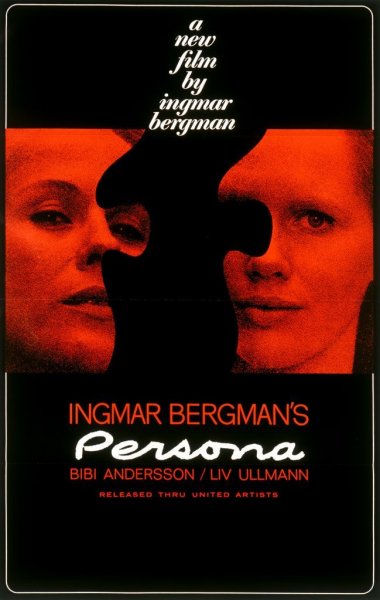
If you like this film, let us know!
Released in USA 6 march 1967
Length 1h20
Directed by Ingmar Bergman
OriginSuede
Genres Drama
Themes L'adolescence, Films about films, Films about children, Pregnancy films, Medical-themed films, Films about sexuality, Bisexuality-related films, LGBT-related films, La sexualité des mineurs, Films about pedophilia, Vampires in film, Films about psychiatry, LGBT-related films, LGBT-related film
Rating80%










Persona is a 1966 black and white Swedish film written and directed by Ingmar Bergman and starring Bibi Andersson and Liv Ullmann. Persona’s story revolves around a young nurse named Alma (Bibi Andersson) and her patient, a well-known stage actress named Elisabet Vogler (Liv Ullmann), who has suddenly ceased to speak. The Latin word persona originally referred to the masks worn by actors on stage.
Persona has been labelled a psychological drama and modernist horror and was subject to cuts due to the film’s controversial subject matter. It is the sixth collaboration between influential cinematographer Sven Nykvist and director Ingmar Bergman and features their trademark minimalism. As with Bergman’s other works, the film is shot and set in Sweden and deals with the themes of illness, bleakness, death and insanity.
Persona is considered one of the major works of the 20th century by essayists and critics such as Susan Sontag who referred to it as Bergman's masterpiece. Other critics have described it as "one of this century’s great works of art". In the British Film Institute's 2012 Sight & Sound’s poll, Persona was ranked the 17th greatest film ever made in the critics' poll (tied with Akira Kurosawa's "Seven Samurai") and 13th in the directors' poll. Persona won the award for Best Film at the 4th Guldbagge Awards and it was Sweden's entry to the 39th Academy Award category for Best Foreign Film. It currently holds a 93% "Fresh" rating at Rotten Tomatoes.
The film was released on 31 August 1966, while the promotional premiere took place on 18 October 1966 at the Spegeln cinema in Stockholm. The film opened in the U.S. on 6 March 1967.
Synopsis
Persona begins with images of camera equipment and projectors lighting up and projecting dozens of brief cinematic glimpses, including a crucifixion, an erect penis, a tarantula spider, clips from a comedic silent-film reel first seen in Bergman's Prison (depicting a man trapped in a room, being chased by Death and Satan), and the slaughter of a lamb. The last, and longest, glimpse features a boy who wakes up in a hospital next to several corpses, reading Mikhail Lermontov's A Hero of Our Time ("Vår Tids Hjälte" in the film), and caressing a blurry, transient image that shifts between Elisabet and/or Alma's faces.Actors

Bibi Andersson
(Alma)

Liv Ullmann
(Elisabet Vogler)

Gunnar Björnstrand
(Herr Vogler)

Margaretha Krook
(The Doctor)
Comments
Leave comment :
Suggestions of similar film to Persona
There are 106 films with the same actors, 55 films with the same director, 61789 with the same cinematographic genres, 12622 films with the same themes (including 0 films with the same 14 themes than Persona), to have finally 70 suggestions of similar films.If you liked Persona, you will probably like those similar films :

The Seventh Seal (1957)
, 1h36Directed by Ingmar Bergman
Origin Suede
Genres Drama, Fantasy
Themes Jeu, Medical-themed films, Films about religion, Films about sexuality, Sports films, Films about chess, Films about viral outbreaks, Films based on plays
Actors Gunnar Björnstrand, Bengt Ekerot, Nils Poppe, Max von Sydow, Bibi Andersson, Inga Gill
Rating81%





Disillusioned knight Antonius Block (Max von Sydow) and his nihilistic squire Jöns (Gunnar Björnstrand) return after fighting in the Crusades and find Sweden being ravaged by the plague. On the beach immediately after their arrival, the knight encounters Death (Bengt Ekerot), personified as a pale, black-cowled figure resembling a monk. The knight, in the middle of a chess game he has been playing alone, challenges Death to a chess match, believing that he can forestall his demise as long as the game continues. Death agrees, and they start a new game.
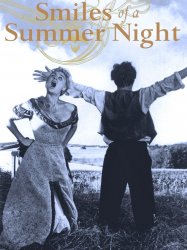
Smiles of a Summer Night (1955)
, 1h48Directed by Ingmar Bergman
Origin Suede
Genres Drama, Comedy, Romance
Themes Films about sexuality, Erotic films
Actors Ulla Jacobsson, Eva Dahlbeck, Harriet Andersson, Björn Bjelfvenstam, Jarl Kulle, Gunnar Björnstrand
Rating76%





The film takes place in Sweden around the turn of the twentieth century. Fredrik Egerman is a middle-aged lawyer married to a 19-year-old beauty, Anne. Their two-year marriage is still unconsummated, due to Anne's reluctance. Fredrik has a son, Henrik, from his marriage to his late first wife. Henrik is in his early twenties and is studying to be a minister but is currently tormented by his love for his step-mother, who secretly loves him in return. Henrik is distracting himself from his urges by attempting an inconclusive affair with Fredrik's lusty young servant, Petra.
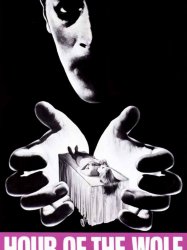
Hour of the Wolf (1968)
, 1h30Directed by Ingmar Bergman
Origin Suede
Genres Drama, Thriller, Horror
Themes Films about sexuality, LGBT-related films, LGBT-related film
Actors Max von Sydow, Liv Ullmann, Georg Rydeberg, Gertrud Fridh, Erland Josephson, Ingrid Thulin
Rating74%





During the opening credits, Bergman can be overheard giving instructions to and discussing with his staff while preparing a shot.
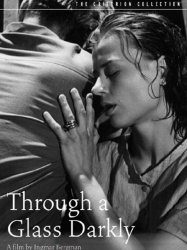
Through a Glass Darkly (1961)
, 1h29Directed by Ingmar Bergman
Genres Drama
Themes Medical-themed films, Psychologie, Films about psychiatry
Actors Harriet Andersson, Gunnar Björnstrand, Max von Sydow, Lars Passgård
Rating78%





The story takes place during a twenty-four hour period while four family members take their vacation on a remote island, shortly after one of them, Karin (Harriet Andersson), is released from an asylum where she has been treated for schizophrenia. Karin's husband Martin (Max von Sydow) tells her father, David, that Karin's disease is almost incurable. Meanwhile, Minus (Lars Passgård), Karin's 17-year-old brother, tells Karin that he wishes he could have a real conversation with his father and cries because he feels deprived of his father's affection. David (Gunnar Björnstrand) is a novelist suffering from "writer's block" who has just returned from a long trip abroad. He announces he will leave again in a month, though he promised he would stay. The others are upset and David gives them unthoughtful, last-minute presents. He leaves them and sobs alone for a moment. When he returns, the others cheerfully announce that they too have a "surprise" for David; they perform a play for him that Minus has written. David, while feigning approval of the play, takes offense since the play can be interpreted as an attack on his character.
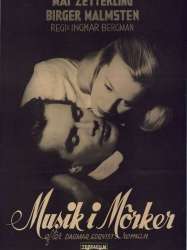
Music in Darkness (1948)
, 1h27Directed by Ingmar Bergman
Genres Drama, Romance
Themes Medical-themed films, Films about disabilities, La cécité
Actors Mai Zetterling, Birger Malmsten, Gunnar Björnstrand, Ingmar Bergman, Naima Wifstrand, Hilda Borgström
Rating63%





The screenplay was written by Bergman and Dagmar Edqvist, whose novel, Music In Darkness, is the basis of the film.

Saraband (2003)
, 2hDirected by Ingmar Bergman
Origin Suede
Genres Drama, Musical
Themes Films about music and musicians, Films about sexuality, Musical films
Actors Liv Ullmann, Erland Josephson, Börje Ahlstedt, Gunnel Fred
Rating74%





The film is structured around ten acts with a prologue and epilogue. It opens with the camera on Marianne standing by a table covered with photographs. It is a well-lit room, and she addresses the viewer. She picks one picture up after another; they are in no particular order, being just heaped all over the table. Some make her smile, or elicit a comment or a sigh. But then she picks up a photograph of her husband, prompting her to reminisce about how they had been more or less happy, and how they'd broken up. She goes on to recall how his second marriage failed, while she was already married to a second husband herself, and then when her second husband died (by flying a glider off somewhere and disappearing), she reflects that it would be nice to see her first husband again.
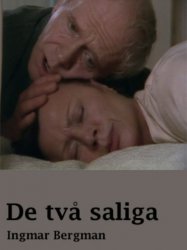
The Blessed Ones (1986)
, 1h21Directed by Ingmar Bergman
Genres Drama
Themes Medical-themed films, Films about psychiatry
Actors Harriet Andersson, Per Myrberg, Christina Schollin, Lasse Pöysti, Irma Christenson, Björn Gustafsson
Rating62%





Sune, a theology student who has dropped out and is also the son of a priest, meets Viveka in a church. The two connect via a theological discussion and eventually get married. As the years pass, Viveka grows more and more emotionally unstable due to jealousy and religious anxiety. Sune accepts Viveka's mental problems and, instead of seeking help for his wife, obeys her increasingly bizarre commands. Eventually Viveka loses her mind completely, locks herself in the couple's apartment while Sune is away, and tries to make neighbours and the police believe that Sune is trying to murder her with a knife. When Sune arrives home Viveka is taken away to a hospital. Sune tries to convince the doctors that Viveka is not insane and should be allowed leave. In the end, Sune turns on a gas tap and lies down next to Viveka so they will die together.
 , 1h50
, 1h50Directed by Ingmar Bergman
Genres Documentary
Themes Films about films, Documentary films about business, Documentary films about the film industry, Documentary films about films
Actors Daniel Bergman, Ingmar Bergman, Gunnar Björnstrand, Allan Edwall, Ewa Fröling, Erland Josephson
Rating74%






Fanny and Alexander (1982)
, 3h8Directed by Ingmar Bergman
Origin Suede
Genres Drama, Fantasy
Themes Films about children, Films about families, Christmas films, Films about religion, Films about Jews and Judaism
Actors Börje Ahlstedt, Anna Bergman, Lena Olin, Harriet Andersson, Gunn Wållgren, Bertil Guve
Rating80%





The story is set during 1907–09 (with an epilogue in 1910), in the Swedish town of Uppsala where Alexander (Bertil Guve), his sister Fanny (Pernilla Allwin) and their well-to-do family, the Ekdahls, live. The siblings' parents are both involved in theater and are happily married until their father, Oscar (Allan Edwall), suddenly dies from a stroke. Shortly thereafter, their mother, Emilie (Ewa Fröling), marries Edvard Vergérus (Jan Malmsjö), the local bishop and a widower, and moves into his ascetic home where he lives with his mother, sister, aunt and maids.

The Virgin Spring (1960)
, 1h29Directed by Ingmar Bergman
Origin Suede
Genres Drama, Thriller, Fantasy, Horror, Historical, Crime
Themes Seafaring films, Films based on mythology, Films about sexuality, Transport films, Rape in fiction, Erotic films, Films set in the Viking Age, Rape and revenge films, Films based on Norse mythology, Auto-justice
Actors Max von Sydow, Birgitta Valberg, Gunnel Lindblom, Birgitta Pettersson, Axel Düberg, Allan Edwall
Rating79%





The Virgin Spring tells the story, set in the late medieval Sweden, of a prosperous Christian whose daughter, Karin (Birgitta Pettersson), is appointed to take candles to the church. Karin is accompanied by her pregnant servant Ingeri (Gunnel Lindblom), who secretly worships the Norse deity Odin. Along their way through the forest on horseback, Ingeri becomes frightened when they come to a stream-side mill and the two part and Karin sets out on her own.
 Connection
Connection